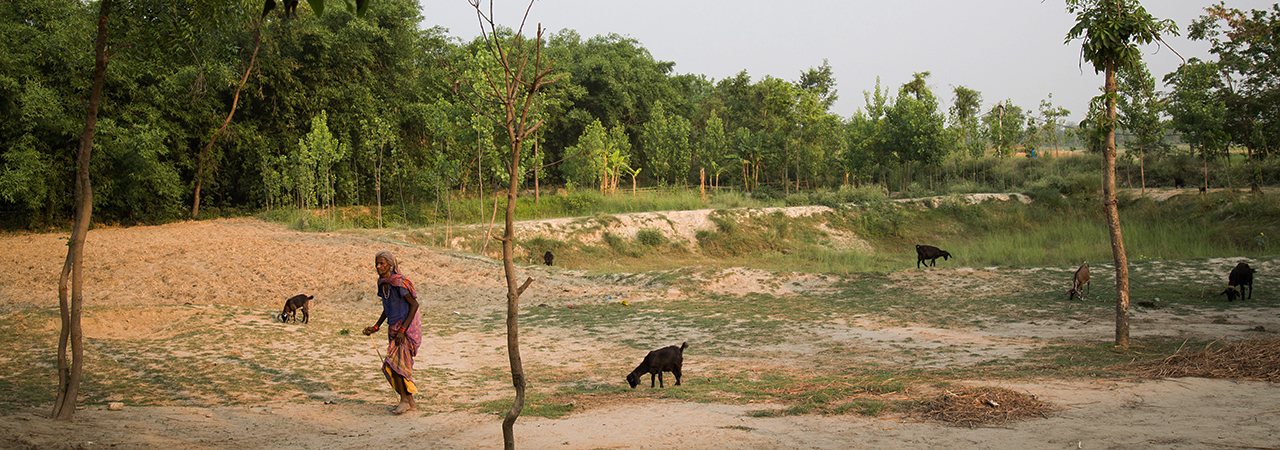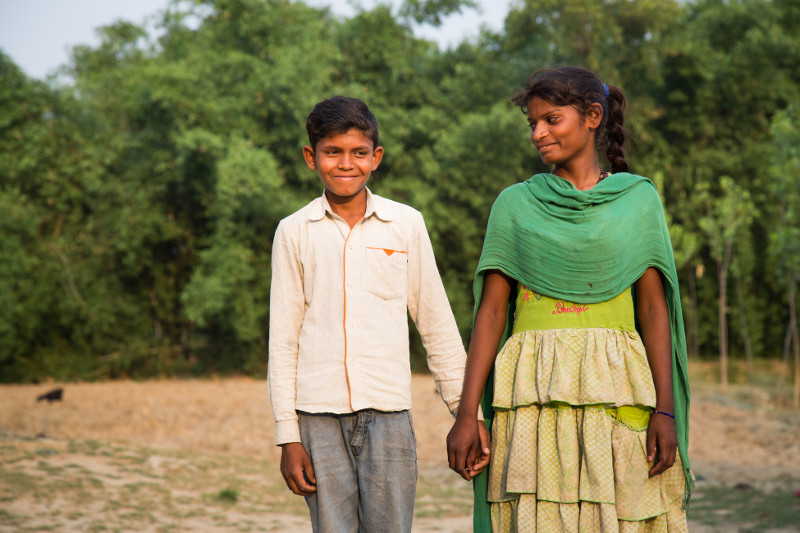

Stopping Human Trafficking in India
The eager smiles of 11-year-old Triveni Kumar and his sister Premshila Kumari, 13, hide a stark reality. When Triveni was born, their mother died in labor. Then in 2013, the two suffered yet another tragedy: Their father died of tuberculosis. Lacking money and motivation, the children withdrew from school.

Triveni Kumar, 11, and his sister, Premshila Kumari, 13, are back in school thanks to the CRS-supported Bachpan project to prevent child migration and human trafficking. Photo by Elie Gardner for Catholic Relief Services
Along the dusty road that winds into their small village in the West Champaran district of Bihar, India, the modest house that their father built sits mostly empty, with the occasional visit from meandering livestock. The children’s guardian, an older brother in his 20s, migrates seasonally for work as an unskilled laborer and sends what little money he earns back to help support his siblings. When their brother is away, the children stay at their uncle’s home next door.
Yet despite their modest circumstances, Triveni has high hopes for his future. He wants to be a doctor someday. Premshila would like to become a tailor. Triveni has a proud demeanor, while his sister is more reserved , but they are tied together by their care for each other.
Thanks to assistance from Catholic Relief Services, the siblings are continuing their education. They were re-enrolled in school through the CRS-supported Bachpan project, which also helps them receive school uniforms and daily lunches. The project is supporting thousands of the most vulnerable families across 12 villages with information about government services they are entitled to and help in applying for benefits.
“The project is helping and empowering our beneficiaries to know about their rights and entitlements,” says Supriya Mukherjee, CRS program manager for the Bachpan project. “We're trying to get them empowered so that they can live a dignified life.”
Asked his favorite thing about school, Triveni says, “I like to study and play.”
Through the Bachpan project, he has also become a peer leader, warning other young people about the dangers of child migration, human trafficking and early marriage.
“I’m helping other children go to school. And when they do not go to school I tell their parents,” Triveni says, adding that he’s enjoying his time on the committee. “I’m happy to help other children not migrate for work.”
Bihar is one of the most populous states in India and also one of the most economically depressed. Child migration and human trafficking are prevalent. One objective of the Bachpan project is to help form, support and strengthen community-based organizations that then become their communities’ watchdogs.
“The magnitude of the problem here is huge,” Mukherjee says. “Poverty is one of the main push factors of child migration. At the same time, there are a lot of pull factors. For instance, children and parents get tempted with the city life. And traffickers come and give them false promises.”
In fact, most families where Triveni and Premshila live earn income as day laborers on large farms. To survive, many migrate seasonally for additional income. A community liaison with the Bachpan project intervened to discourage Triveni and Premshila from migrating with their brother. As a member of the Bachpan project village child protection committee, the liaison worked with this group to help the children get government benefits and go to school.
Now, Triveni and Premshila each receive $15 a month from the government of India. They recently used some of the money to buy kerosene and food.
“We are happy to have the help,” Premshila says. “That makes us feel good. We have hope for the future.”

